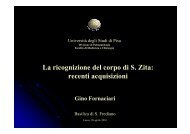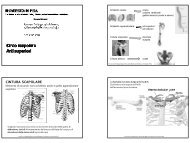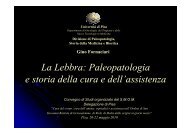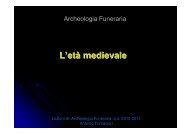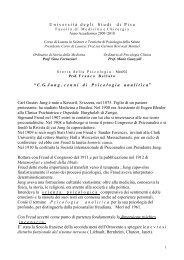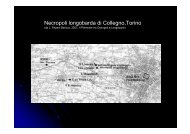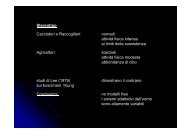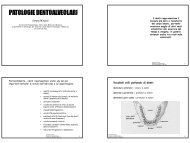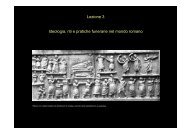Fondamenti della lingua inglese Laura Cignoni - Paleopatologia
Fondamenti della lingua inglese Laura Cignoni - Paleopatologia
Fondamenti della lingua inglese Laura Cignoni - Paleopatologia
You also want an ePaper? Increase the reach of your titles
YUMPU automatically turns print PDFs into web optimized ePapers that Google loves.
La posizione di questi avverbi è prima del verbo principale, ma dopo il verbo to be.<br />
Elements of grave furniture or dress could be used as offerings but this is not always the case.<br />
La posizione dell’avverbio also (anche) è prima del verbo principale, ma dopo il verbo to be.<br />
The Association’s Annual Survey has also found that the average debt has increased.<br />
Per situazioni stabili.<br />
She lives in Rome.<br />
Verità generiche.<br />
Time is money.<br />
Nephropathy and retinopathy remain important complications of type 1 diabetes.<br />
The remains we find in excavation are skeletons, which once were corpses, and these in turn<br />
were once human beings. (The Archaeology of the Dead, 2).<br />
Per situazioni permanenti.<br />
Water boils at 100 degrees centigrade.<br />
Con i verbi di senso che esprimono una condizione o uno stato (to have, to own, to possess, to<br />
belong, to be, to seem, to sound) percezione involontaria (to see, to hear, to taste, to feel, to smell),<br />
sentimento (to love, to like, to enjoy, to hate), volontà (to desire, to want, to wish), opinione o<br />
attività mentale (to believe, to forget, to know, to recognize, to think).<br />
Con valore futuro dopo le seguenti espressioni: if, unless, till, until, when, whenever, while, as, as<br />
soon as, as long as, before, after, in case, directly.<br />
57<br />
When I see him, I will tell him.<br />
As soon as he arrives, he will call them.<br />
TAG QUESTIONS<br />
Le cosiddette Tag Questions corrispondono alle espressioni italiane vero? non è vero? e si formano<br />
ripetendo il verbo ausiliare o modale <strong>della</strong> frase principale seguito dal pronome soggetto.<br />
They’re leaving in June, aren’t they?<br />
Se il verbo <strong>della</strong> frase principale non è un verbo ausiliare o modale, si usa il verbo ausiliare del<br />
tempo <strong>della</strong> frase principale (do, does, did).<br />
Se la prima frase è affermativa, la Tag Question sarà negativa, se la prima frase è negativa, la Tag<br />
Question sarà affermativa.



